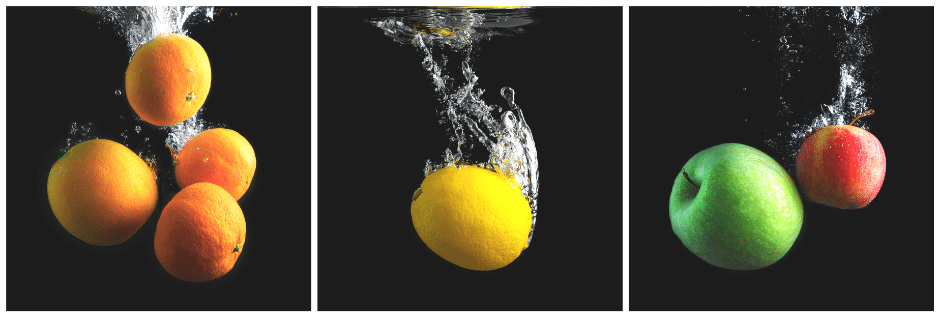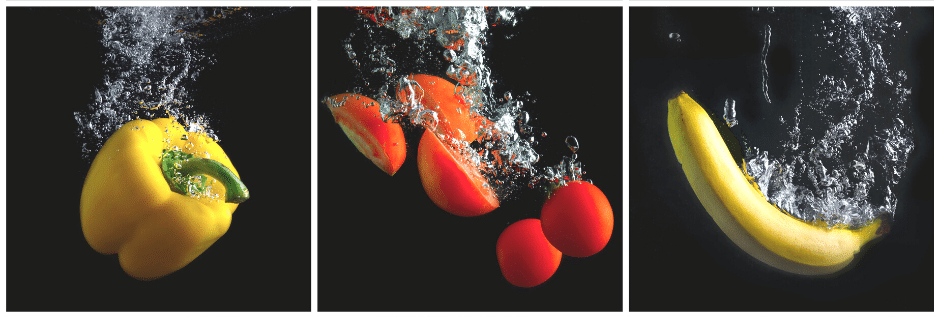
With summer having arrived, thoughts go to everything outdoors; things like barbeques, lake days, softball league, and gardening. As we become more active outdoors, and the temperatures rise, it is vital to stay hydrated. Our body is about 60% water and requires water for digestion, lubrication of joints, flushing wastes, and cellular function. Making sure that you are properly hydrated can also help control your appetite, improve your energy and concentration, and help your heart and other muscles work more efficiently.
Did you know that you can eat certain fruits and vegetables to help you stay hydrated? As a bonus, you will also get all the nutritional benefits each food item has to offer, and be one snack closer to reaching your daily fruit and/or vegetable intake. Below are two tables summarizing a few examples of fruits and vegetables that have a high water content and their nutritional benefits.
| Fruit | Nutritional Benefits | Water Content |
| Cucumbers | Vitamin A, Vitamin C, Potassium – helps blood pressure, Skin/anti-aging benefits | 95% |
| Oranges | Vitamin C, Antioxidants, Aids digestion/helps with indigestion, Prevention of kidney stones, Blood sugar regulation | 88% |
| Pineapple | Vitamin C, Antioxidants, Manganese – helps metabolism, Bromelain – helps break down proteins to aid in digestion and has anti-inflammatory properties | 86% |
| Strawberries | Vitamin C, Antioxidants, Manganese, Folate – important for tissue growth and cell function, Potassium, Aids in digestion, Blood sugar regulation, Heart health benefits | 91% |
| Blueberries | Vitamin C, Vitamin K, Manganese, Antioxidants (they are one of the best sources for antioxidants compared to all other fruits/vegetables), Heart health benefits, May help prevent urinary tract infections, Anti-inflammatory | 85% |
| Peaches | Vitamin A, Vitamin C, Antioxidants, Skin/anti-aging benefits, Aids in digestion, Heart health benefits, May help with allergies | 89% |
| Vegetable | Nutritional Benefits | Water Content |
| Bell Peppers | Vitamin A, Vitamin C, Vitamin B6 – helps make new red blood cells, Vitamin B9, Vitamin E, Vitamin K – essential for blood clotting, Potassium, Antioxidants | 92% |
| Cabbage | Vitamin C, Vitamin K, Aids in digestion, Can help with inflammation, Heart health benefits | 92% |
| Celery | Vitamin A, Vitamin C, Vitamin K, Antioxidants, Aids in digestion, Can help with inflammation, Blood sugar regulation | 95% |
| Iceberg Lettuce | Vitamin A, Vitamin C, Vitamin K, Potassium | 95% |
| Spinach | Vitamin A, Vitamin C, Vitamin K, Antioxidants, Folic acid, Iron, Calcium, Aids in digestion, Helps regulate blood pressure | 91% |
| Radishes | Vitamin C, Potassium, Antioxidants, Aids in digestion, Hearth health benefits, Heart health benefits, Has antifungal properties | 95% |

Depending on how many fruits and vegetables you eat during the day, you can potentially get 25-35% of your total water intake from food1! Next time you need to bring something to a picnic or family get-together choose a thirst-quenching fruit salad, vegetable tray, or vegetable salad to help you and everyone else at the party stay hydrated.
By Lindsey Englar, Wellness Center Coordinator, ACE
Sources:
- Guelinckx I., Tavoularis G., König J., Morin C., Gharbi H., Gandy J. Contribution of water from food and fluids to total water intake: Analysis of a French and UK population surveys. Nutrients. 2016;8:630. doi: 10.3390/nu8100630.

